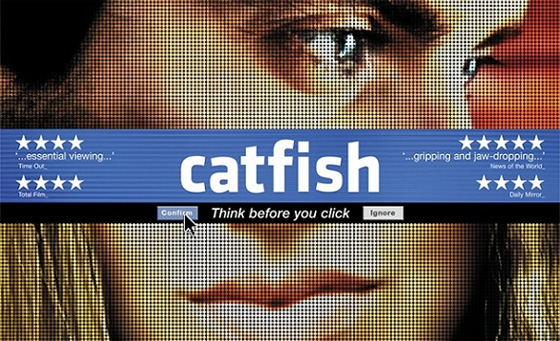An increasingly mysterious online relationship forms the backdrop for a compelling documentary.
The first thing to say about Catfish is that you should know as little as possible before seeing it.
This was a common refrain when it premièred to buzz and acclaim at Sundance back in January, but it really is true.
So, even though this review won’t reveal full spoilers, if you haven’t seen the film I’d highly recommend you stop reading this right now and come back after watching it.
It begins when Nev, a 24-year-old photographer based in New York, is contacted online by Abby, an 8-year-old girl from Michigan, who wants permission to paint one of his photos.
An online correspondence develops with Abby’s family and things get stranger when Nev also virtually befriends Abby’s older sister, Megan, who appears to be a musician and model.
Up to this point everything we see has been filmed by Nev’s brother Ariel Schulman along with their friend Henry Joost, and in a pivotal scene Ariel persuades his sibling to actually meet Abby and Megan in the real world.
This is when things get really interesting, with the gradually unfolding mystery playing like a suspense thriller.
Except this is arguably more exciting, as fictional films can often be predictable and this is anything but that, as we share the curiosity and excitement of the three young men on screen.
It also explores the impact of modern technology and how the web has gradually embedded itself into the rituals of everyday life, through mobile devices, email, social networking sites and video.
These issues are reflected in the form of the film, which was co-directed by Ariel Schulman and Henry Joost. The raw footage was shot handheld on consumer digital cameras and the online elements are cleverly integrated into the overall look.
When they set off on a journey we see it through a Google Maps graphic; we see close-ups of the central characters using Facebook and the visual look of the film reflects a generation who don’t think twice about filming their everyday lives.
The titles and graphics are tastefully rendered and the editing is especially noteworthy, managing to build and maintain the raw suspense whilst never letting the basic story drag.
Watching it with an audience at the London Film Festival was fascinating: they audibly gasped at certain moments and it seemed to tap right in to contemporary questions and fears about how people connect online.
Unsurprisingly, it made a big impact at Sundance and was the subject of a bidding war before being acquired by Rogue Pictures and Universal, who gave it a limited US release last October.
But it was also at Sundance that some viewers began to ask questions about the film and doubt its veracity as a documentary.
This is where the story gets even more interesting: does the film have a ‘truth problem’? Was it manipulated for effect? Is it even a documentary?
In a year that has seen ‘fake’ documentaries like Exit Through The Gift Shop and I’m Still Here, such questions seem to reflect a wider ambiguity about the genre itself.
As for Catfish, there are nagging doubts that creep in retrospectively.
Was it always their intention to make a film? Would a group of savvy New Yorkers really be this naïve about strangers online? Are the events that unfold too structurally perfect?
There is also one scene where they look at videos on YouTube which seems like the audio has been altered in post-production, although this may not be the case.
Charges that the film is a fake documentary have been vigorously denied by the filmmakers ever since the likes of Morgan Spurlock and Zach Galifianakis cast doubt on it at Sundance.
Unless there is compelling evidence to suggest otherwise, proving whether the film was real or not is possibly a rabbit hole from which no definitive conclusion can be drawn.
As for my own take, it seems that the film is basically real but polished in post-production to the point where people began to have nagging doubts about its presentation of events.
Whatever the truth, it seems fitting that a film which depicts the uncertainty of online identities should have its own personality crisis.
Despite, or possibly because of this, Catfish is still a notable achievement.
It captures a cultural mood, inspires instant debate and stretches the documentary form in new and imaginative ways.
Catfish opens at selected UK cinemas on Friday 17th December and is also available to watch on various VOD platforms including iTunes, Lovefilm and Sky Box Office
> Official site
> My strange Catfish experience at the London Film Festival
> Reviews at Metacritic
> Movieline and Moviefone on the ‘truth’ of Catfish (Spoilers)
> Guardian article on Catfish (Major spoilers so don’t read unless you’ve seen the film)
